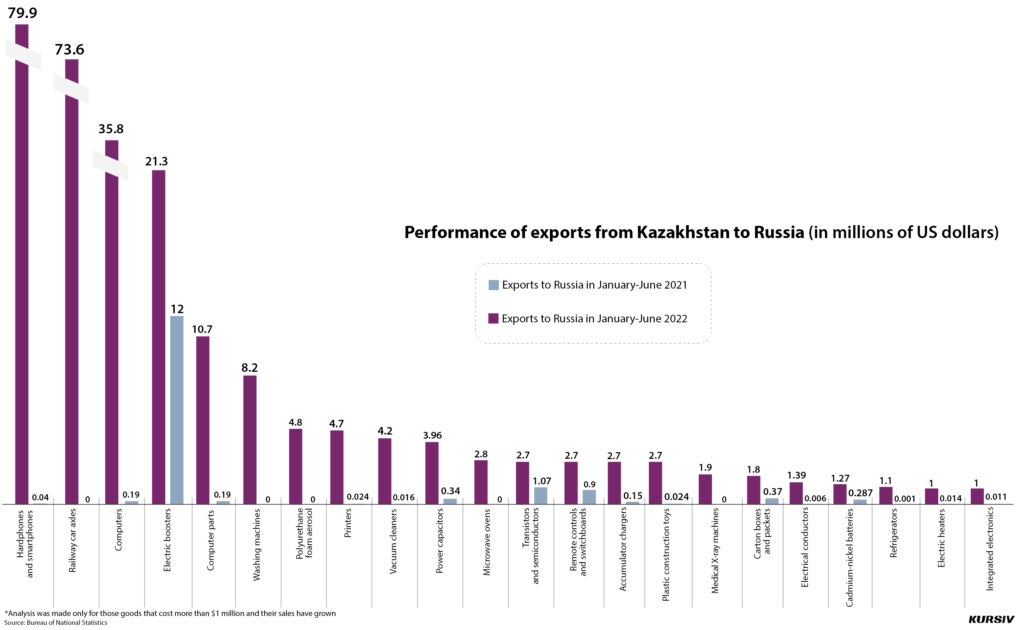Kazakhstan increases manyfold its re-export to Russia
Over the past six months, Kazakhstan sent to Russia $184 million worth of shipments of different high-tech products, even though the country doesn’t produce these goods. Neither the European Union nor the U.S. have officially restricted the re-export of home appliances or computers from Europe to Russia via third-party countries. However, the U.S. is keeping an eye on this issue and already has put Kazakhstan on the list of transit countries that are used by Russia to get exports from abroad.
Over the past six months, Kazakhstan’s export to Russia increased just slightly from $3.37 billion to $3.38 billion (0.5%). However, the share of computers, home appliances and other gadgets has risen manyfold.
Analysis of 16 commodity items has shown that the Kazakhstani exports of these high-tech products to Russia increased from $15 million to $184 million. For some goods, the number of shipments rose 2,000 times (in terms of money). For example, Russians bought 611 mobile phones in Kazakhstan for $40,600 over six months last year. In the same period this year, the export of mobile devices has risen to 199,900 items ($79.9 million).

It works approximately the same way for computers. This year Kazakhstan sent Russia $35.8 million worth of computers while in the first half of last year this export was about $190,000.
Both Russia and Kazakhstan have made clear their official positions toward indirect re-exports. Russia’s Vladimir Putin has officially legalized grey imports, while Kazakhstan firmly said that it doesn’t support the idea of grey imports to its Northern neighbor. Kazakhstan’s Committee for State Revenues insists that despite growing export to Russia in the first half of the year, no facts of re-export were noticed.
Georgiy Vlastopulo from a company called Optimalnaya Logistika (Russia, Kazakhstan) says that it is not a big deal to check the entire route of a computer or mobile phone from a producer to an end-user thanks to identification numbers and MAC addresses which help to track any device all over the world.
«If Kazakhstan sharply increases its procurement of some goods in Europe, which it normally used to buy in a small amount, of course, it would raise some suspicions. Russia hasn’t revealed its statistics since the invasion of Ukraine. However, the EU member states make no secret of this data and can track their goods, although they prefer to close their eyes to these re-exports except for dual-use products, of course. European politicians do not want to ruin the international trade. That’s why they do not raise an issue of secondary sanctions,» said the expert.
Vlastopulo says that there are some legal schemes for trade with Russia that Kazakhstan can rely on. This is so-called false transit when a product, which is subject to European sanctions heads from Europe to Kazakhstan via Russia where it finds its place in a local warehouse. This product might be sold to one Russian buyer and then to another. However, if this truck with such goods enters Kazakhstan, this scheme has no ground to work. Kazakhstani customs won’t allow such a product to be re-exported to Russia.
«Some high-tech products, including computers, can’t be sold directly from Europe and the U.S. to Russia. Nevertheless, there is no official ban that would prevent third-party countries from re-exporting European and American products to Russia. Kazakhstan just has its clear understanding that there is no good to be engaged in this transit because of the potential risk of consequences, namely secondary sanctions,» said Vlastopulo. No doubt, Western countries know about these schemes of the Russian parallel imports. The U.S. Department of Commerce’s Bureau of Industry and Security (BIS) has already identified 18 countries, including Kazakhstan and China, that facilitate the transit of sanctioned goods to Russia and Belarus as transshipment points. As a result, the U.S. government has urged financial institutions to be vigilant against efforts by individuals or entities to evade BIS export controls implemented in connection with Russia’s further invasion of Ukraine.

